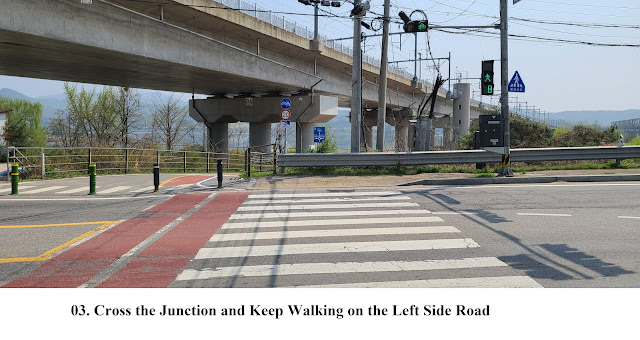1. Preface
The Namyangju Walking Trek Course along with Bike Road was renovated with old abandoned narrow gauge rail course and opened in 2011 as a nice Walking Trek Course exclusive for the bike and person. This Course is linked with Dasan Walking Trek Course from Paldang Station to Woongilsan Station in Gyeonguei Jungang Train Line. Therefore I rearranged the Dasan Course to the Namyangju Walking Trek Course 1 as see at the Namyangju Walking Trek Course Table attached below. In this regards, total Namyangju Walking Trek Course turned eventually out as 45 Km and 13 walking hours including 3 hours break.
2. Course Guide Information
Namyangju Walking Trek (NYWT) Course 2 is starting from the Woongilsan Station to the Guksu Station in Gyeonguei Jungang Train Line (GJTL) as about 15 km distance walking alongside Bike Road for about 4 hours including 1 hour break during the Course. We will pass underpass tunnel soon after exit Gate 2 at the Woongilsan Station and Walking to the Yangsu Station through steel bridge as see at the Photo 4 ~ 14. Thereafter you will pass the five tunnels to reach the Guksu Station as see at the Photo 18, 21, 22, 23, 26 and 46. Please see followings are summary and overall observation of the NYWT Course 2 linked to https://www.youtube.com/watch?v=aMGoCGDmaQw.
3. Historic and Background Information
There are several places or spot where some cultural and historic background and which you may feel interest or useful for your better understanding. Please refer followings to brief explanation.
3-1) Yangsu Station
Yangsu Station is in relation with area name as Yangsuri Village at the Station which means Bukhangang (North Hangang) River and Namhangang (South Hangang) River are joining together at the Yangsuri Village which was originally calling as a Dumulmeori Village as pure Korean word. But this original village name was later changed to Yangsuri Village taking in consideration writing in Korean meaning in Chinese Character. Many Korean words are still using Korean Writing translating to Chinese Character meaning. But these kinds of writing system and style has been changed to or back to pure Korean writing, no consideration for previous Chinese Character meaning system or style. Present young generation, we used to call M.Z generation (20 ~30 years old) are not mostly interested in any Chinese Character and its meaning.
.3-2) Sujongsa Temple at Woongilsan Mpuntain
King Sejo, 7th King in Joseon Dynasty was one day made trip to Geumgangsan Mountain presently in North Korea territory and supposed to stay overnight at this Yangsuri Village and strangely heard calm sound remotely ringing bell sound at the middle of the night. So he instructed his assistants to go and check what happened where last night. His assistants reported him after surveying around that there was rock tunnel around where Arhat was sitting with full smile and resonance sound raising from water dropping at the tunnel. King Sejo ordered his assistants to build Sujongsa Temple at the Woongilsan Mountain around year 1439 which was widely repaired and renovated in Year 1459. Thereafter this temple was continuously eroded and fully repaired again in 1890. There were several repair works at the Temple which is maintaining at the Woongilsan Mountain, 610 m above sea level, just elegantly positioning in front of Woongilsan Station.
3-3) Sinwon Station
Sinwon means newly opened station which was originally built at Seosi Myeon Village in Yanggeungun District and later reorganized administration district in 1914 and changed to its name location as present Sinwon area.
3-4) Guksu Station
Guksu Station means remarkably beautiful chrysanthemum which looks like fantastic chrysanthemum station. Guksuri Village was originally belongs to Seosimyeon Town in Yanggeungun District which was later reorganized in 1914 as Yangpeonggun District. The Guksuri Village was finally expanding to neighboring village like Sincheonri Village, Dapdari Village and Biseokgeori Village which was calling as present name as Guksuri Village.








%20View.jpg)











































댓글 없음:
댓글 쓰기